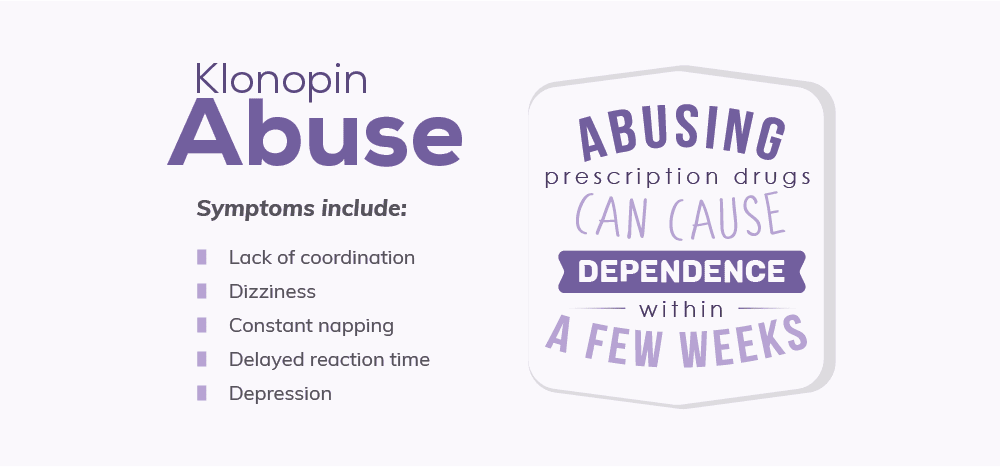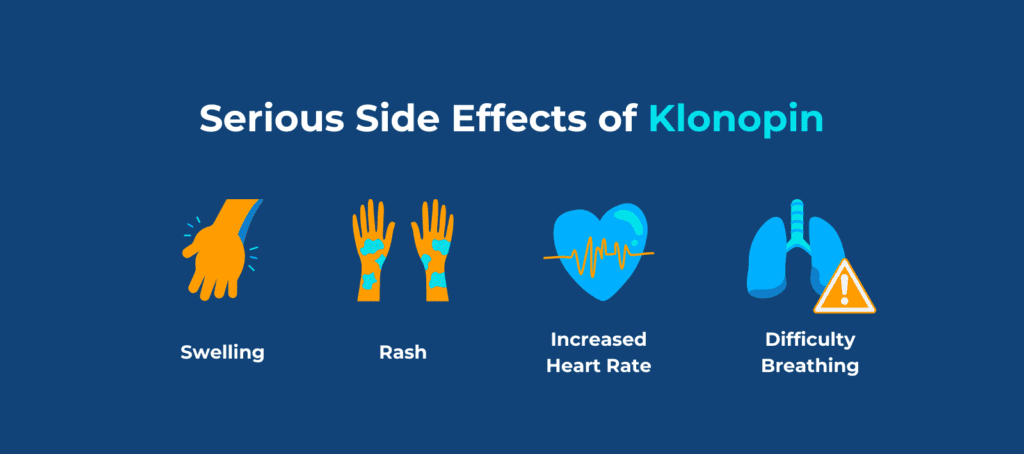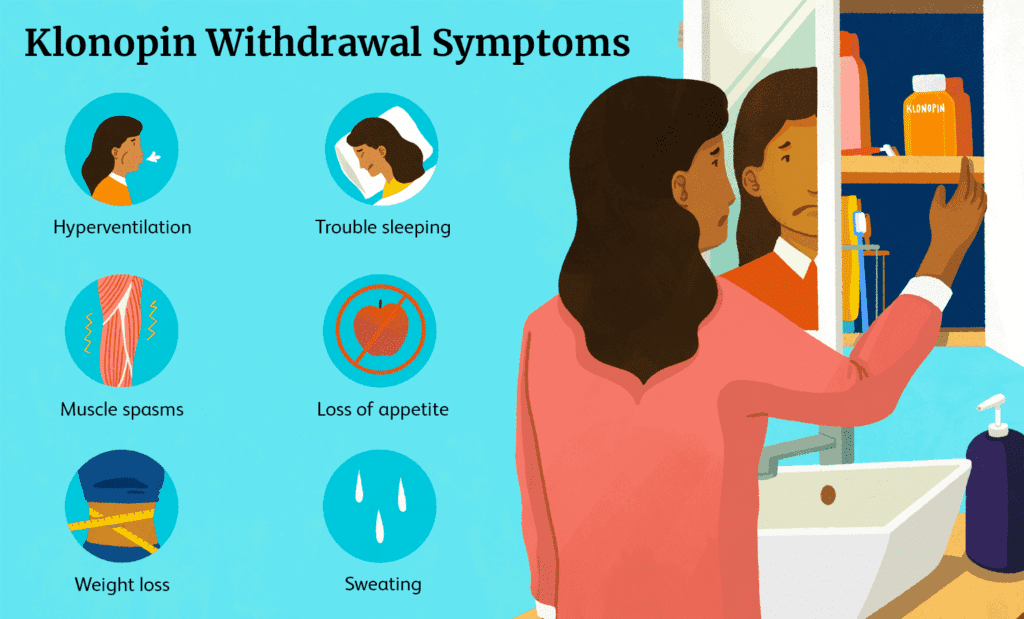Klonopin abuse side effects can not only cause permanent damage to your health but can deteriorate your quality of life as well.
Being a sedative medication and an anti-convulsant drug, it is used to help people with anxiety. This drug helps prevent seizures and reduces anxiety from panic attacks. However, this drug is highly addictive and a regular user of Klonopin can develop a dependency on this drug.
Research shows that benzodiazepines like Klonopin are one of the most commonly prescribed psychotropic drugs worldwide. About 2% to 7% of the general population of the United States have been using this drug for the long term.
One of the dangers of using drugs like Klonopin is that this drug can lead to Klonopin abuse side effects, dependence, and nasty withdrawal symptoms when the use of this drug is stopped.
It is no secret that any addiction can hamper an individual’s health, social status, and dignity by decreasing their quality of life. Therefore, we have put together this blog, where you will find information related to Klonopin abuse side effects, its causes and symptoms.

Ignoring the signs won’t make them disappear!
What is Klonopin?
Broadly speaking, Klonopin (which is also known as clonazepam), is a benzodiazepine drug. This drug has hypnotic, sedative and anti-convulsant properties. In simpler terms, this drug is a muscle relaxant.
Klonopin works by relaxing the central nervous system of the body. This drug is useful for people with seizures, panic attacks and anxiety disorders as it acts fast once it is ingested orally.
Due to the properties of Klonopin, this drug is favored by doctors to help patients with a history of mild to moderate seizures and panic attacks. It slows the functions of the body and relaxes the neurotransmitters in the brain, leading to relief.
However, one of the dangers of using and abusing Klonopin is that it can lead to Klonopin dependency, addiction, and Klonopin abuse side effects. Unfortunately, a whopping 46% of the patients who are admitted for substance abuse disorders are abusers of benzodiazepines like Klonopin.
Another research proved that 3 to 7.9 per 1 million people who are prescribed Klonopin die from Klonopin overdose. Due to this reason, Klonopin is prescribed as a short-term treatment.
Is Klonopin addictive?
Like other drugs from the category of benzodiazepines, Klonopin also offers muscle relaxant properties. This drug renders a feeling of intoxication and euphoria. Individuals may want to abuse this drug to get relief from their negative feelings and reach a temporary state of relaxation.
Even if an individual strictly adheres to the advice of a certified medical professional, they might develop something called Klonopin tolerance when they use this drug for a long time. Klonopin tolerance means that small doses of Klonopin will no longer be effective for an individual and that they need higher doses of this drug to feel the same effect. This means that the doctor will not have to prescribe higher doses of Klonopin to render the same level of relaxation to the patient. This is a vicious cycle because in such a case, a patient will undergo nasty withdrawal symptoms when the use of this drug is ceased.
The statistics are even more alarming. More than 75,000 people who are admitted to the emergency room every year suffer from complications arising out of Klonopin.
Klonopin works within an hour of ingesting this medicine orally. Since this drug is a central nervous system depressant, it slows the neurotransmitters of the brain and helps the patient feel relaxed. Some individuals may mistake the Klonopin abuse side effects because of the following pleasurable feelings that are a result of Klonopin use:
- Feeling of euphoria
- A relaxed state of mind and slow decision-making capabilities and reflexes
- A feeling of serenity and calmness
- Relaxation of the muscles and reduced stress, tension and agitation
- A feeling of drowsiness and easiness in falling and staying asleep
Individuals who are suffering from stress and tension in their everyday personal and professional lives may be tempted to use Klonopin for these effects. As a result, they might end up abusing this drug. This may start the vicious cycle of Klonopin abuse, addiction and/or dependency. Once addicted, an individual may start to experience Klonopin abuse side effects.
Therefore, the answer to this question is, yes, Klonopin is highly addictive and should strictly be used as per the instructions of a certified medical professional.
What are the symptoms of Klonopin abuse side effects?

Klonopin abuse side effects are quite common in individuals who abuse Klonopin for a feeling of euphoria and intoxication. Since every individual is built differently, Klonopin abuse side effects may vary from one individual to another.
The severity and complexity of Klonopin abuse side effects depend on the length, frequency, and dosage of abuse. However, the following symptoms of Klonopin abuse are common in almost every individual who abuses Klonopin:
Symptoms affecting the mood of an individual like
- Irritability and short temper
- Depressive disorder
- Unnatural feeling of euphoria
- Increased feeling of anxiety
- Increased panic attacks
Additionally, Klonopin abuse side effects may also include behavioral symptoms like the following:
- Agitation
- Going to different doctors to obtain prescriptions of Klonopin, also known as ‘doctor shopping’
- Having an obsession with seeking this drug by hook or by crook
- Stealing prescriptions of Klonopin from other patients
- Forging prescriptions to buy Klonopin
- Insomnia or difficulty in falling or staying asleep
- Lethargy and drowsiness
- Poor performance at work and difficulty in interpersonal relationships
There are numerous physical symptoms of Klonopin abuse as well:
- A loss of muscle control
- Diarrhea or constipation
- Loss of balance
- Dizziness and drowsiness
- Soreness of muscles
- Feeling numb in some parts or all over the body
- Excessive perspiration
- Extreme changes in sex drive
- Increased salivation or urination
- Being breathless all the time
- Sensitivity to light and sounds
Klonopin abuse may also lead to the following psychological symptoms
- Hallucinations
- Extreme changes in personality
- Impaired decision-making capability
- Cravings of Klonopin
- Suicidal thoughts
- Memory loss or inability to recollect the events when Klonopin was in the system
- Difficulty comprehending and an inability to think
What are the causes of Klonopin abuse side effects?

By now, we are positive that the dangers of Klonopin abuse side effects are quite evident. Klonopin is highly addictive and because of the euphoric effects of this drug, individuals who abuse Klonopin to achieve a feeling of euphoria are prone to overdosing.
Klonopin addiction can be attributed to genetic, environmental, and psychological causes and the brain chemistry of an individual. Let us discuss each one below:
Genetic Causes
People whose close relatives like parents, siblings, or grandparents suffer from or are prone to substance abuse disorders are vulnerable to developing addictions in their lives.
Brain Chemistry
Benzodiazepines like Klonopin are central nervous system depressants. This means that Klonopin works by manipulating the neurotransmitters in the brain and decreases the amount of serotonin in the brain. Therefore, individuals who naturally lack these neurotransmitters in the brain are tempted to abuse benzodiazepines like Klonopin as a corrective measure to reverse their brain chemistry.
Environmental Factors
People who grow up in households where substance abuse disorders and addictions are prevalent may feel that substance abuse is an acceptable coping mechanism to combat stress in everyday personal and professional life. Since such people are not taught how to deal with stressful situations healthily and constructively, they often turn to central nervous system depressants like Klonopin to deal with stress.
Psychological Causes
People who have pre-existing mental health illnesses are more prone to addiction to Klonopin even if it is prescribed by a certified medical professional. In such cases, long-term abuse of Klonopin may lead to worsened mental health conditions and various other Klonopin abuse side effects.
What are the factors affecting Klonopin abuse side effects?
By now, it is a fact that Klonopin abuse can lead to Klonopin dependency and the potential for an overdose. Klonopin tolerance can result in the patient needing to take high doses of this drug which can also lead to withdrawal symptoms.
When Klonopin is abused for its pleasurable and euphoric effects, it can lead to a hormonal imbalance in the brain. This gives an unnatural ‘high’ and can result in an addiction. The following factors may affect the side effects of Klonopin abuse.
- The duration of abusing the substance
- The dosage of substance abuse
- The frequency with which the substance is being abused
People who abuse Klonopin for long durations may have to undergo severe withdrawal symptoms from Klonopin abuse. This is because the body becomes used to functioning with Klonopin in the system and will start craving this drug.
Additionally, people who abuse Klonopin will also begin to think differently and will redirect their attention to obtaining this drug. This affects the professional life and interpersonal relationships of an individual.
How can Klonopin abuse side effects be avoided?
It is a fact that people who take Klonopin as per the prescribed dosage are less likely to undergo the side effects of this drug. This is because a certified medical professional will deeply assess the history and the vitals of an individual before prescribing this drug.
Additionally, when a doctor notices the first signs of Klonopin dependency, they will be able to handle the situation effectively. Therefore, Klonopin abuse side effects can be avoided by adhering to the medical advice while taking this drug.
Tired of fighting addiction and mental health struggles?
Ignoring both deepens the struggle. Our holistic approach—detox, therapy, and medication-assisted treatment—can help you heal. Take the first step today.
FAQs
1. Is Klonopin safe for long-term use?
The short answer to this question is, no. There is a possibility of Klonopin abuse side effects if this drug is not taken as prescribed. If the doctor’s advice is adhered to, there is a lesser risk of side effects. If this drug is taken for a period longer than 2 weeks, there can be a potential to develop addiction and dependency on this drug.
2. What are the common Klonopin abuse side effects?
Symptoms like nausea, vomiting, loss of muscle control, irritation, depression, euphoria, anxiety, agitation, lethargy, dizziness, and excessive perspiration, are common Klonopin abuse side effects and point towards Klonopin abuse.
3. Does Klonopin make you aggressive?
Klonopin abuse side effects are often linked to behavioral side effects as well. These behavioral side effects can include agitation, aggression, hyperactivity, temper tantrums, destructive behavior, and irritability.
4. Is Klonopin a high-risk drug?
Yes, Klonopin is considered a potentially high-risk drug. Even if an individual strictly adheres to the recommended doses of this drug, they are vulnerable to a risk of Klonopin abuse side effects by developing a dependency on this drug that may lead to addictions, misusing this drug that may lead to an overdose. Klonopin overdose can cause permanent damage and may be fatal.
5. Who should not take Klonopin?
People who have disorders related to the lungs, kidneys, or the liver should not take Klonopin. Additionally, people who face problems related to the spine, or are suffering from cerebellar ataxia should not take Klonopin as they are already struggling with stability, and slurred speech. People who have a history of alcohol or drug abuse should also stay away from Klonopin as this drug is highly addictive and can give similar intoxicating effects to that of drugs and alcohol. Lastly, individuals who have recently faced the bereavement of a loved one, have depressive or suicidal thoughts, or have a history of self-harm should also stay away from Klonopin as this drug is a neurotransmitter and can affect the hormonal chemistry of the brain.
Conclusion
There is no doubt that seizures, anxiety disorders, and panic attacks are serious mental health conditions that can affect the quality of life. In such patients, benzodiazepines like Klonopin can help manage the illnesses that are affecting their mental health.
However, an individual should strictly adhere to the prescribed dosage and frequency of Klonopin as this drug can be highly addictive and can result in nasty Klonopin abuse side effects. Klonopin abuse can lead to Klonopin tolerance and an individual will have to take higher doses of Klonopin to feel the same effect. High doses of Klonopin can also lead to Klonopin overdose.
Klonopin abuse side effects can best be avoided by adhering to the advice of a certified medical professional in terms of dosage and frequency of taking this drug. Additionally, this drug should never exceed the recommended tenure if taking it.
Klonopin is one such drug that is capable of making you addicted leaving you directionless. Any kind of drug addiction can be a burning cause of your constant confusion, anxiety, fear of the unknown, and mood swings. In such scenarios, having an expert by your side makes things possible where you tend to start giving words to your thoughts and this makes your condition better. Avisa has a team of experts who are here to assist you in conquering drug addiction and guiding you toward a joyful and healthy life of sobriety.
















